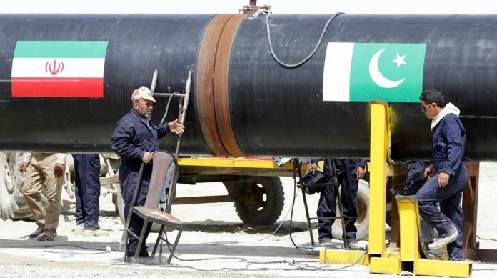Pakistan said Thursday that it does not need a waiver from U.S. sanctions to build its portion of a pipeline to import natural gas from Iran.
“It is a segment of the pipeline which is being built inside Pakistani territory. So, we do not believe that at this point there is room for any discussion or waiver from a third party,” Mumtaz Zahra Baloch, the Pakistani Foreign Ministry spokesperson, said in response to a VOA question at the weekly news briefing.
Donald Lu, U.S. assistant secretary of state for South and Central Asia, said Wednesday that the department was monitoring the planned pipeline between Iran and Pakistan. He told a hearing of the House Foreign Affairs Committee that Islamabad had not requested a sanctions waiver to conduct gas trade with Iran.
“We have also not heard from the government of Pakistan [on a] desire for any waiver for American sanctions that would certainly result from such a project,” Lu said.
Last month, Pakistan’s outgoing caretaker government gave approval to begin construction of an 80-kilometer section of the pipeline, largely to avoid paying Iran billions of dollars in penalties for years of delays on the $7 billion project.
Pipeline’s history
Pakistan and Iran have been in talks to build a gas pipeline between the two countries since the mid-1990s.
The two sides signed a Gas Sales and Purchase Agreement in June 2009 for a pipeline that would supply 750 million to 1 billion cubic feet per day of gas to energy-starved Pakistan from Iran’s South Pars Field.
The two sides held an inauguration ceremony at the border in 2013 for construction on the Pakistani side. Iran had already begun work on its side in 2010.
While Iran claimed it had completed construction of 900 kilometers of the pipeline on its side by 2011, construction has not started on Pakistani side until now.
Islamabad suspended the project multiple times as officials cited concerns that Pakistan would invite U.S. sanctions for importing energy from Iran. Tehran faces U.S. banking sanctions for its nuclear program.
Over the years, Iran repeatedly threatened to take Pakistan into international arbitration and slap it with a penalty of nearly $18 billion for breach of contract. Just as time was running out for Islamabad to meet Tehran’s deadline of commencing construction by March 2024, the country’s outgoing government green-lighted the project.
In the approved first phase, Pakistan will construct an 80-kilometer section of the pipeline from its border with Iran to its port city of Gwadar in the southwestern province of Balochistan.
Pipeline’s future
Pakistan spent more than $17 billion on energy imports last year. It was a reduction from prior years as demand for fuel fell with rising inflation.
According to the International Energy Agency, natural gas makes up the largest proportion of Pakistan’s energy portfolio. Nearly a third of it is imported.
Although Pakistan does not need a sanctions waiver from Washington to build the pipeline, it will require it to buy Iranian energy.
Washington-based security affairs expert Kamran Bokhari told VOA that while Pakistan could build the case for a waiver from Washington to buy gas from Iran, it has little room to negotiate.
“Pakistan has very little leverage right now because Pakistan has too many asks of the U.S. because of its economic, financial situation,” he said.
Pakistan’s internal and external debt is ballooning. The country is on its way to seeking a 24th bailout from the International Monetary Fund.
Bokhari said Washington would also be unwilling to allow any arrangement for Pakistan that could help Iran.
“[The] United States is locked in a very strategic regional struggle with the Iranians, and they need to be able to make sure that the Iranians do not get breathing space,” he said.
Countries that purchase energy products from Iran do so in limited quantities to avoid U.S. sanctions.
Naeem Yahya Mir, former managing director of state-run Pakistan State Oil, told VOA that Pakistan could bypass U.S. banking sanctions by not paying for Iranian gas with dollars.
“If you negotiate, they [Iran] have been doing barter … also it is in their [Iran’s] interest to open this market,” Mir said. “It’s a mutual benefit.”
In June 2023, Pakistan authorized barter trade with Iran as its foreign exchange reserves dipped to dangerously low levels. However, Bokhari does not believe Pakistan can viably barter for Iranian gas in the long run.
Mir, who also served as the technical adviser for Kuwait Petroleum Corporation for nearly three decades, blamed Pakistani bureaucracy for the delay in building the pipeline and failing to request a waiver from Washington to buy gas from Iran.
“It is not the U.S., it is Pakistan’s internal decision-making process. … They can’t make decisions.”
If Pakistan gets to the second phase of the project with Iran, it will extend the pipeline to the country’s southern region, which could be prohibitively expensive for the cash-strapped country.
Lu told the committee it will not be easy for Pakistan to arrange funds for the project.
“Honestly, I don’t know where the financing for such a project would come from,” Lu said. “I don’t think many international donors will be interested in funding such an endeavor.”
Lu said the U.S. is working with Pakistan to explore other sources of energy, including environmentally friendly options.






